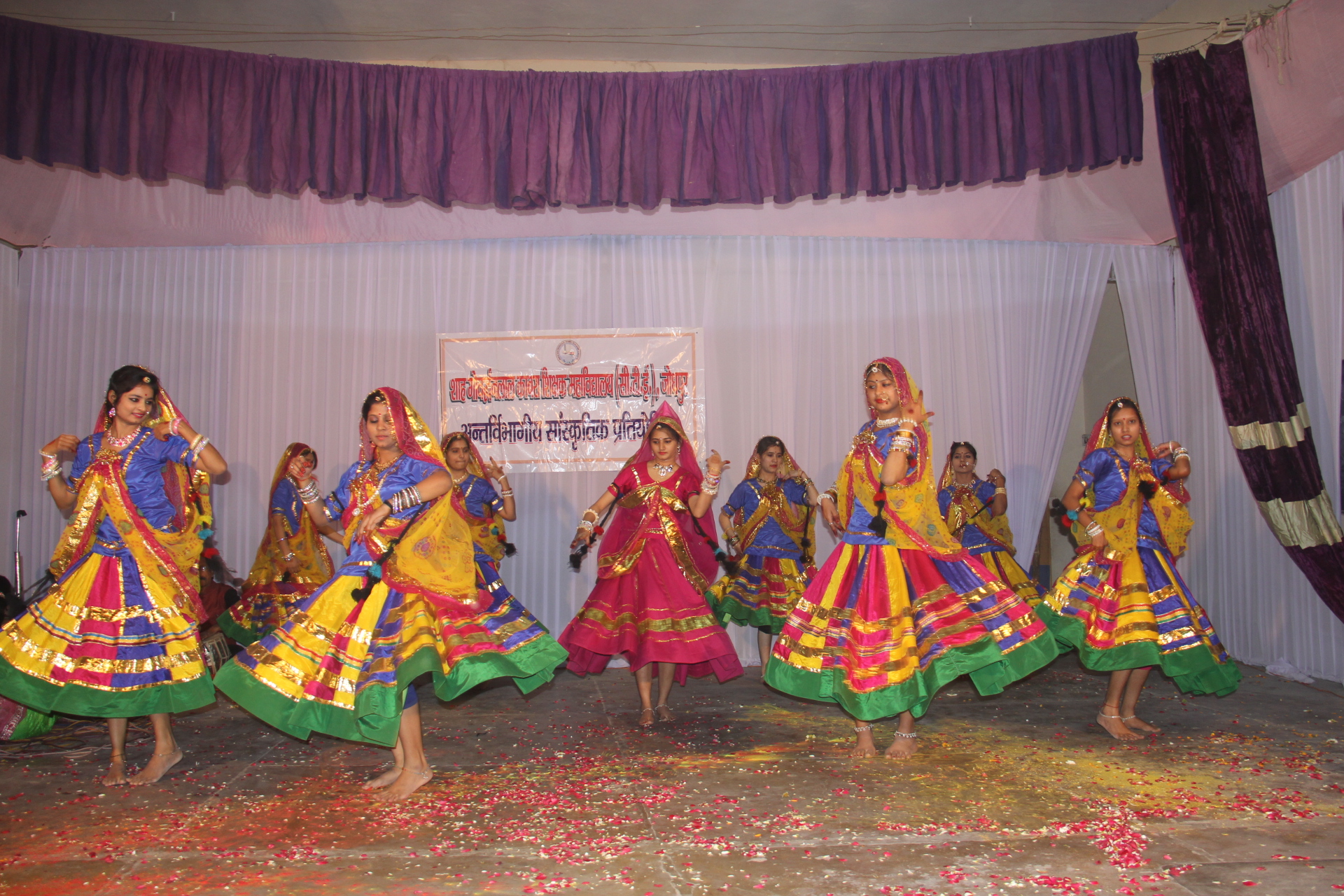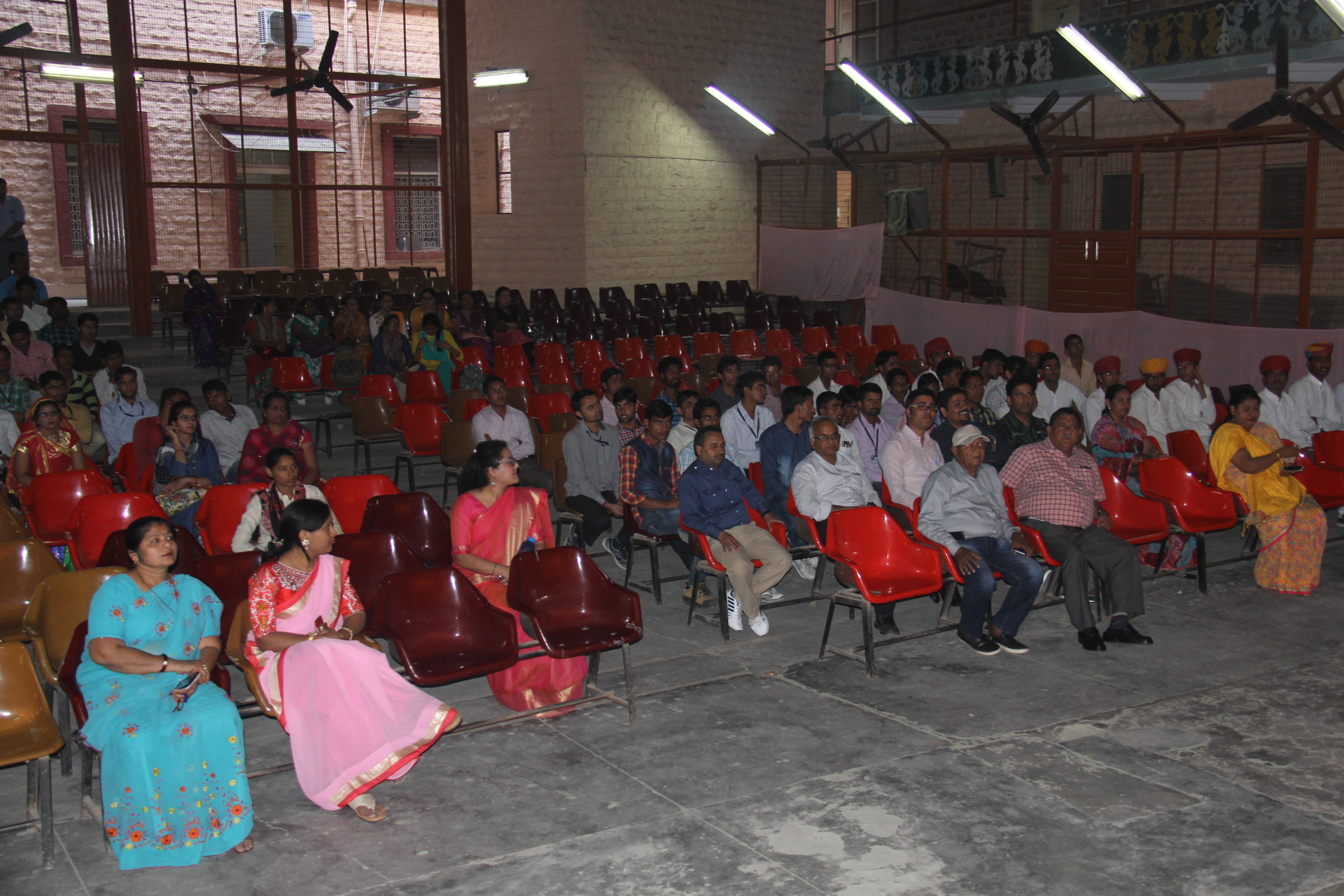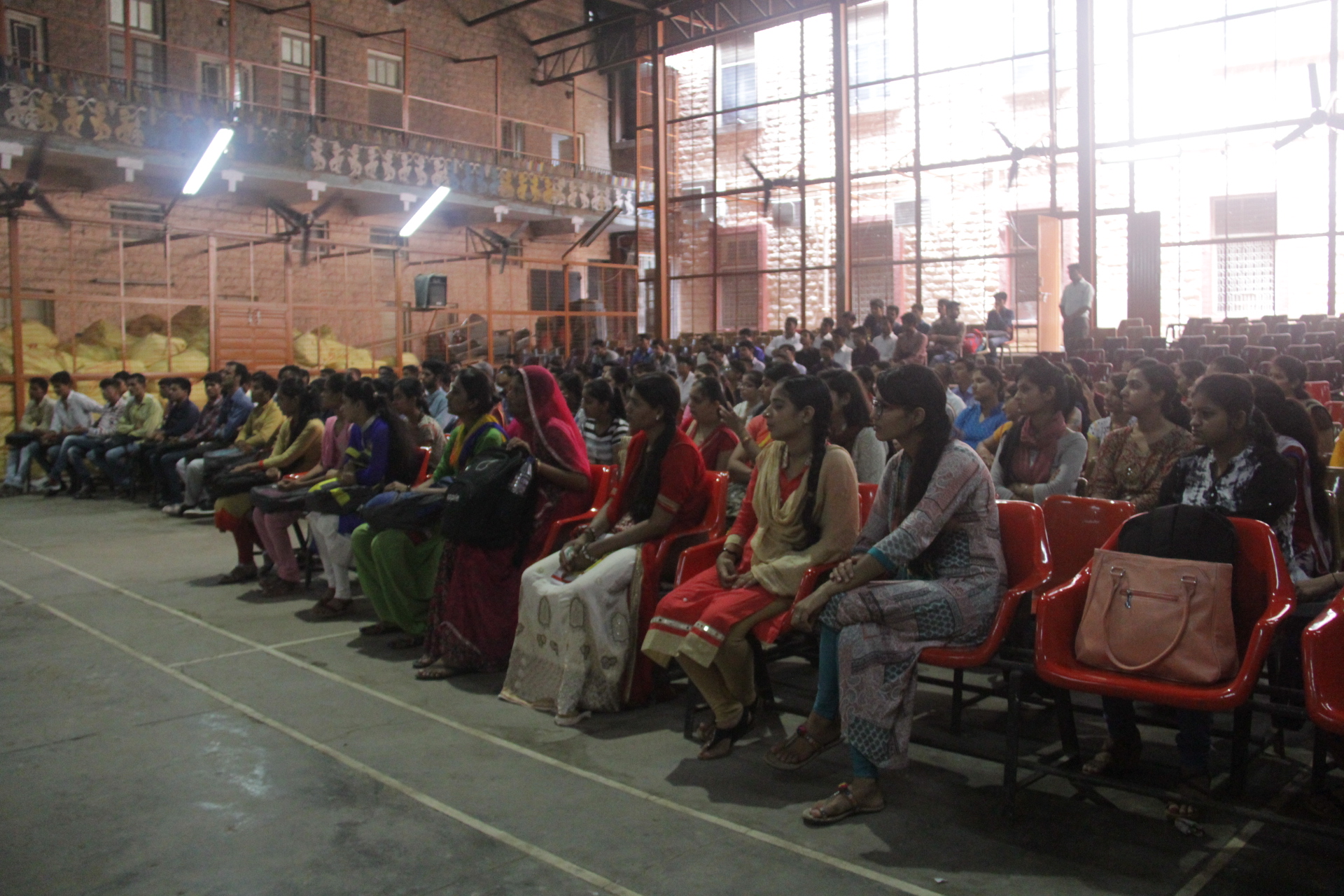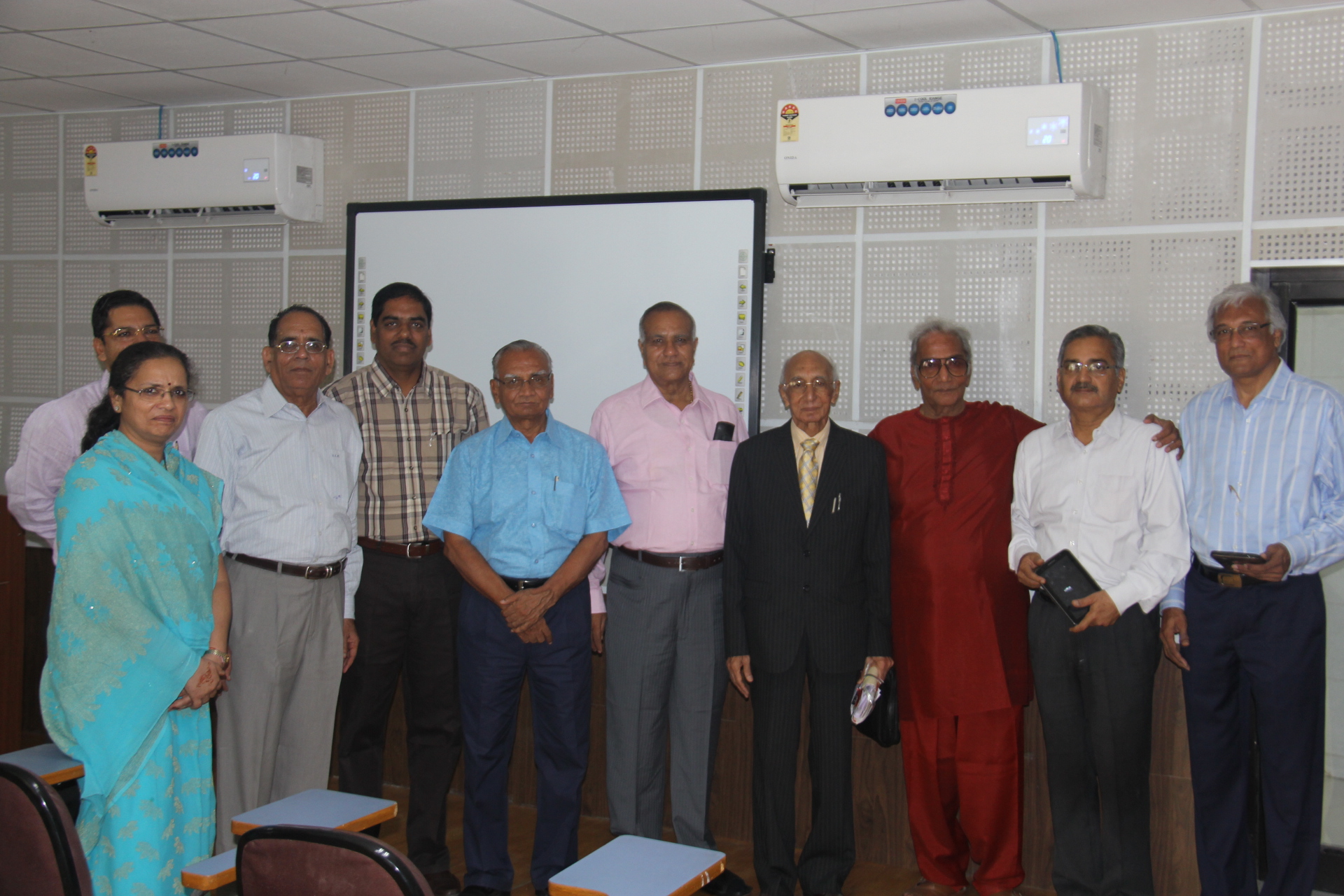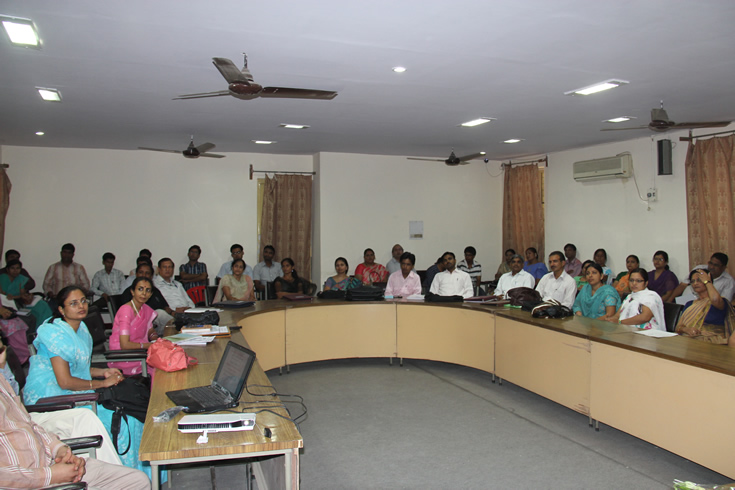| 1 |
Paper-I Psychology of Learning And Development |
|
PAPER- I PSYCHOLOGY OF LEARNING AND DEVELOPMENT
PAPER- I PSYCHOLOGY OF LEARNING AND DEVELOPMENT
OBJECTIVES-
Students will be able:-
To understand concepts and principles of Educational Psychology as an applied science.
To understand implications of psychological theories for education.
To acquaint the learner with the process of development and assessment of various abipties and traits.
To assess personalities and modified their teaching strategy according to needs of students.
To use adjustment strategies in their day to day life.
To understand the Concept of Intelligence, Emotional and Spiritual Intelligence.
To understand the concept of Cognition and metacognition and different cognitive process
To understand inclusive education from Psychological point.
To understand the theories of Development.
COURSE CONTENT
UNIT – I SCHOOL OF PSYCHOLOGY AND LEARNING THEORIES
School of Psychology An Introduction to – Behaviourism, Purposivism, Gestalt, Psycho-analysis.
Learning Theories with Class-room implications: Skinner’s Operant Conditioning, Lewin’s Cognitive field Theory, Cognitive and Contextual Theories: Learning by Insight by Kohler, Bandura, Vygotsky; Contribution of Piaget, Bruner and Ausuble to learning.
UNIT – II PSYCHOLOGY OF LEARNER AND TEACHING LEARNING PROCESS-
(A) Psychology of Learner: Psychology of exceptional children, Gifted and low achievers.
(B) Motivating the learner, Maslow’s self-actualization and McCleland’s Achievement Motivation with reference to research done in India.
(C) Creativity – Concept, measurement and teaching for creativity.
(D) Constructivism & learning
(E) Group dynamics: Concept, structure and process, Class-room climate and educational implications,
(F) Transfer of Learning: Concept and Implications for Education
(G) Inclusive Education: Need, Process and Barriers.
UNIT – III PERSONALITY AND ADJUSTMENT-
Theories of personality – Psycho-analysis, Trait theory-Cattell and Allport Measurement of personality through projective and semi-projective techniques.
Adjustment: Psychology of adjustment, adjustment processes and different adjustment mechanism. Mal-adjustment, Juvenile delinquency and corrective measures.
UNIT – IV INTELLIGENCE
(A) Intelligence: Concept, Nature and Theories (Spearman, Thurstone, Guilford, Gardner and Sternberg).
(B) Measurement of Intelligence.
(C) Developing Emotional and Spiritual Intelligence.
UNIT-V COGNITION, META-COGNITION AND THEORIES OF DEVELOPMENT
(A) Cognitive Processes: Sensation, Attention, Perception, Cognition, Problem -solving
(B) Metacognition- Meaning, Dimensions, Difference between meta-cognition and cognition, Ways of developing Metacognitive strategies and Self -regulation.
(C) Theories of development
– Piaget’s Cognitive development
– Freud’s Psycho-sexual development
– Erikson’s psycho-social development
– Having Hurst’s developmental tasks
– Kohlberg’s moral development
– Gessel’s Maturation theory.
(D) Development concept according to Eminent Indian Thinkers: Aurobindo, J Krishnamoorti, Giju Bhai Baghela
SESSIONAL WORK/ PRACTICUM-
Any Two of the following-
(A) Case study of an exceptional child
(B) An institutional Case study with reference to inclusive education.
(C) Administration, Scoring and interpretation of any one of the following psychological test on one subject-
- Performance test of intelligence.
- Projective/ semi- projective personality test.
REFERENCES-
-
- Alur, M. & Timmons, V. (Eds.). (2009). Inclusive education across cultures: Crossing boundaries, sharing ideas. New Delhi: SAGE Publications India Pvt Ltd.
- Anastasi, A.: Psychological Testing, Macmillan Co., New York, 1971
- Ausubel, D.P.: Educational Psychology – A Cognitive View, Holt Rinehart, New York, 1968
- Baker, H.J.: Introduction to Exceptional Children, Macmillan Co., New York, 1957
- Bigge Morris, L. & Hunt Maurce, P. (1968) : Psychological Foundations of Education, 2nd Edition, N.Y. Harper & Row.
- Biggee Morris C., and Row,(1971) : Learning Theories for Teachers, 2nd Edition N.Y.Harper.
- Blair, Jones Simpson: Educational Psychology, Macmillan CO., New York, 1968
- Cattell, R.B.: Description and Measurement of Personality, World Book Co., New York, 1946
- Dave, Indu: ShikshakeManovaigyanikAdhar, Rajasthan Hindi Granth Academy, Jaipur, 1971
- Dececco John, P., (1968) : The Psychology of Learning and Instruction, Prentice Hall of India, New Delhi
- Goleman, D.L. (1995) : Emotional Intelligence. London: Bloowsbusy
- Mathis, B.C. and Others: Psychological Foundation of Education, Academic Press, New York, 1970
- McCellland, D. et. al.: The Achievement Motives, Applleton-Century Crofts, New York, 1953
- Moully, H.C. (ed.): Reading in Educational Psychology, HoltReinhart, New York, 1971
- Piagert, J.: Science of Education and the Psychology of Child, Viking, New York, 1970
- Stones, E. (ed.): Reading in Educational Psychology, Methuen Co.., London, 1870
|
| 2 |
Paper-II Philosophy and Sociology of Education |
|
PAPER-II PHILOSOPHY AND SOCIOLOGY OF EDUCATION
PAPER-II PHILOSOPHY AND SOCIOLOGY OF EDUCATION
OBJECTIVES-
Students will be able to:-
- Understanding the nature and functions of philosophy of education.
- Logical analysis, interpretation and synthesis of various concepts, propositions and philosophical assumptions about educational phenomena.
- Understanding and use of philosophical methods in studying educational data.
- Critical appraisal of contributions made to education by prominent educational thinkers-both Indian and Western.
- Understand and relate philosophical theories with educational practices.
- Understand and relate philosophical traditions with educational practice.
- enable the student to explain and reflect on- Gender ideology, Relationship between education and social change with special reference to modernization and globalization,
- Understand Relationship between concepts and processes of sociology and education, Theories and characteristics of sociological analysis and its relation to education.
- Understand and explore the meaning, aims, purposes of education
- Develop understanding of sociological dimension of education.
- Understand the Peace education, Gender
COURSE CONTENT
UNIT – I NATURE AND MODERN CONCEPT OF PHILOSOPHY
- The Nature of Philosophy : Use of Philosophy, Branches of Philosophy, metaphysics, epistemology and axiology and their implications for education, Philosophical redirection of educational research in recent times.
- Modern concept of Philosophy and Contributions of Thinkers: Analysis-Logical analysis, Logical empiricism and Positive relativism- (Morris L. Prigge) Contributions of Vivekananda, Tagore Gandhi Dewey, Krishnamurti, Montessori, Gijubhia, A.Nagraj and to educational thinking.
UNIT – II INDIAN PHILOSOPHICAL FOUNDATION OF EDUCATION
- Indian Philosophical Foundation of Education; Characteristics of Indian Philosophy.
- Education as conceived in Vedic times.
- Nature of the Learner, goals of life theory of knowledge and ethical values as advocated in the following philosophies : Jainism, Nyaya, Vedanta (Upanishad, Geeta and Advaita Vedanta only)
- Teacher student relationship as manifested in Bhagwad-geeta and Upanishad.
UNIT – III WESTERN PHILOSOPHICAL FOUNDATIONS OF EDUCATION:
- Naturalism: Its metaphysics and epistemology, aims of education educative process, freedom and discipline in education according to Naturalism.
- Idealism : Its metaphysics and theories of knowledge, the nature of learner, aims of equation, teacher-pupil relationship, method of education, freedom of and discipline values in education and curriculum according to idealism.
- Realism: Its metaphysics and theories of knowledge, aims of education, nature of the learner and educative process according to Realism.
- Pragmatism: Its metaphysics and theories of knowledge, the nature of the learner aim of education, teacher-pupil relationship, method of education and curriculum according to Pragmatism.
- Existentialism: Its development with special reference to Sartre and its implications for education.
UNIT – IV SOCIAL DETERMINANTS OF EDUCATION
- Education as a Social sub-system- Education as a social sub-system. Concept of social system, Specific characteristics of education as a social sub-system, Education and its relationship with other social sub-systems i.e. family, caste and state.
- Education as a Social Process.
- Socialisation- Meaning, Agencies, Theories of Socialization, Process of socialization, social, economic and cultural differences in socialization: implications for inclusion.
- Culture- Concept, Meaning, Characteristics, Role of family, caste and state in preservation, transmission and enrichment of culture; acculturation and its Process.
- Meaning and importance of peace education to address social issues.
UNIT – V CHANGING DIMENSIONS OF EDUCATION IN REFERENCE TO SOCIETY
- Change and Education, Concept of change and planned change, Process of planned change, Functions and qualities of change agent,
- Social mobility,
- Modernization and education,
- Education and Gender, Gender ideology in society. Role of religion, constitution and law in gender ideology. Gender differentiation, stereotyping and inequality in society in reference to gender discrimination.
- Present status of women’s education in India..
- Social Dimension of Indian Education, Approaches to religious and moral education Humanistic and Spiritualistic Approaches, Socialistic pattern of society and education, existing educational disparities.
SESSIONAL WORK/ PRACTICUM-
Group A (Any one of the following)
- One term paper and three abstracts of articles published in some Educational Standard Journals.
- Visit a school to study the philosophical ideology of the school; and prepare a report based on your observations and experience.
- Analyze the contribution of Giju Bhai in the light of child centered Education
- Study the contents of Geeta in Reference to teacher child relationship and education management.
AND
Group B (Any One of the following)
- Socio-metric study of a class consisting of not less than 25 students.
- Prepare a questionnaire on different aspects of socialization and administer it on at least 30 students (homogeneous group) to find out the most influencing aspect. Prepare a report on entire activity.
REFERENCES-
-
- Adam, S.D.: Education Modernization in Asia, Addition Wiley Publishing Co. Philosophies, 1970
- Altekar, A.S.: Education in Ancient India, Book Shop, Varanasi, 1934.
- Aurbindo and Mother: Oa Education, Shri Arubindo Ashram, Pondichery, 1969
- Brown, F.: Educational Sociology
- Butler, I.D.: Four Philosophies (3rd ed.), Harper & Bros, New York, 1969
- Core, N.S. Desai, I.P. and Simon Chitnis (ed.): Papers in Sociology of Education, N.C.E.R.T., New Delhi, 1967
- Dent, H.C. British Education, Longmans Press, London, 1961
- Educational Commission Report (1964-66): Government of India, New Delhi, 1966
- Grifin&Pareek, U.: Planned Change in Education, Somaiya Publications Pvt. Ltd
|
| 3 |
Paper-III Education and Curriculum Studies |
|
PAPER- III EDUCATION AND CURRICULUM STUDIES
PAPER- III EDUCATION AND CURRICULUM STUDIES
OBJECTIVES-
Students will be able to:-
- Introduce the nature of education studies and map the fields.
- Apply key principles across educational systems.
- Introduce Education studies as a ‘discipline’ with its own academic community, its own distinctive discourse and methods of enquiry.
- Understand the factors from historical perspective that contributed to present education system.
- Acquaint the students with the political economy of education.
- Understand the Pre-independence and post-independence development of education in India.
- Orient to the institutions, systems and structures of education and flag the contemporary concerns of education policy and practice.
- Understand that development of Education is influenced by political forces of the time.
- Develop their critical capabilities through the selection, analysis and synthesis of relevant perspectives, and to be able to justify different positions on educational matters.
- Understand Restructure and standards based on reform of elementary and secondary education
- Understand the common challenges in educational system of world.
- Conceptualize the meaning and different perspectives of curriculum
- Understand the epistemological, sociological and the psychological basis of curriculum development.
- Understand the different types of curriculum with respect to their main orientation and approaches .
COURSE CONTENT
UNIT- I NATURE OF EDUCATIONAL STUDIES
- Meaning, concept, perspectives (Historical, Political, Economical) aims, and values of educational studies and educational issues.
- Defining principles of education studies.
- Field of Educational studies & education studies as a discipline.
- Education in Vedic Period, Buddhist Period, Medieval Period : Concept, ideas, Agencies of Education, Organisation of Education, teacher pupil relationship and their duties, curriculum, methods of Teaching, women Education, relevance to the Present day education.
- Economics of Education:- Meaning, Aims, Scope and Significance
UNIT – II INSTITUTIONAL SYSTEM AND STRUCTURE OF EDUCATION:-
- Structure & System of education in India from primary to higher education.
- Commonalities & common challenges, in educational systems of world,(social injustice, inclusion, gender discrimination,)
- Restructure and standards based on reform of elementary and secondary education.
- Social Justice, Inclusion, Gender Discrimination, Mental & Physical well- being, Peace and Human Values.
UNIT – III CONTEMPORARY EDUCATIONAL POLICIES AND PRACTICES:-
- Relationship of Education and Politics with special reference to Democracy and Secularism in Indian context
- SSA & RTE act: Introduction, constitutional provisions, chapters and salient features, impact on Indian Education.
- Educational Reform in post -independence India.
- Contemporary challenges of UEE
- National and state level reform in school education
- Employment opportunities and placement in educational institutions, organizations and economic enterprises engaged in education and training.
UNIT -IV CURRICULUM AND EVALUATION
- Concept of Curriculum, Components of curriculum: objectives, content, transaction mode and evaluation.
- Epistemological, Social and Psychological foundations of curriculum.
- Principles of Curriculum Construction
- Principles of formulating- aims, specifying content, defining teaching learning experiences and evaluation procedure.
- Formative and Summative Evaluation.
UNIT- V CURRICULUM DEVELOPMENT
- Factors affecting Curriculum change- Social factors, Pressure groups, Writers and publishers.
- Role of teacher as a Curriculum maker : Integration of learning experiences related to work experiences, sensitivity to gender disparity, peace oriented values, health and needs of children with disabilities, art and India’s heritage of crafts.
- Understanding of NCFTE-2009 in reference to curriculum development.
- Eclectic Model of Curriculum Design
- Taba’s Model of Curriculum Development
SESSIONAL WORK/ PRACTICUM –
Group A (Any One of the following)-
- Compile articles from newspapers, magazines, or internet on educational issues. Prepare a report with suggestion for solutions.
- Review of related literature to justify the role of Political/Economic/Historical foundation of education in shaping of education.
AND
Group B (Any One of the following) –
- Prepare a paper on comparative study of National curriculum of any two countries at any level.
- Study any one policy with special reference to curriculum and prepare a report- National Policies of Education – 1986, 1992(modified version) and POA on NPE-1996 in relation to National curriculum frameworks that were developed later, Detailed study of National curriculum framework of school Education, India (1988, 2000, 2005).
REFERENCES-
-
- Agrawal, J.C: Land Marks in the History of Modern Indian Education, New Delhi
- Bloom, B.S., Hastings, J.T. &Madaus, G.F. (1971): Handbook of Formative and Summative Evaluation Student Learning. New York: McGraw Hill.
- Education and National Development: Report of the Kothari Commission on Education, New Delhi, 1966.
- Forsyth, I., Jolliffe, A. & Stevens, D. (1999): Evaluating a Course. Practical Strategies for Teachers, Lectures and Trainers. London: Kogan Page.
- Forsyth, I., Jolliffee, and A. & Stevens, D. (1999): Planning a Course. Practical Strategies for Teachers, Lectures and Trainers. London: Kogan Page.
- Govt. of India: Programme of Action – National Policy on Education, Ministry of Human Resource Development, New Delhi, 1986.
- Kneller, G.F.(1993): Foundation of Education: New York and London: John Wiley and Sons, Inc.
- Koul, J.N. (1975): Higher Education, Social Change and National Development. Shimla: Indian Instit
|
| 4 |
Paper-IV Introduction to Research Methodology and Statistics |
|
PAPER- IV INTRO TO RESEARCH METHODOLOGY AND STATISTICS
PAPER- IV INTRODUCTION TO RESEARCH METHODOLOGY AND STATISTICS
OBJECTIVES-
Students will be able to:-
- Describe the nature, purpose, scope, areas, and types of research in education.
- Explain the characteristics of quantitative, qualitative and mixed research.
- select and explain the method appropriate for a research study
- conduct a literature search and develop a research proposal
- explain a sampling design appropriate for a research study
- Examine the nature of hypothesis and their roles in research, and discuss possible alternatives to use hypothesis.
- Explain research design and procedure for collection of analysis.
- Develop listening and writing skills for good Expository writing.
- Select and use appropriate statistics for analysis and interpretation.
- Familiarize with basic educational statistics so as to make them better equipped to read educational research and literature.
COURSE CONTENT
UNIT – I INTRODUCTION TO EDUCATIONAL RESEARCH
- Nature of Scientific Inquiry, Nature of Science, Steps of Scientific Method:
- Relationship between Theory and Research: Definition and Characteristics of a scientific theory, Nature of Scientific research, Basic and applied research, Relationship between theory and research
- Areas of educational research
- Research paradigms in education: qualitative, mixed and quantitative, and their characteristics, Types of researches under each paradigm.
UNIT – II INITIATING RESEARCH
- The Research Problem: Perception of a Problem, Sensitivity to a research problem, Identifying, selecting and defining a research problem.
- Hypothesis: Formulation of Hypothesis, Characteristics, Types, importance and criteria of good hypothesis,Collection of evidence, Testing Hypothesis, Arriving at generalization
- Use of reference material and library survey.
UNIT – III ESSENTIALS OF RESEARCH AND RESEARCHER
- Methods of Educational Research: Historical Method, Philosophical Method, Survey Method, Action Research
- Sampling: Importance of sampling, Units of Sampling, Methods of selecting sample: Random Sampling, Stratified Sampling, Purposive Sampling, Cluster Sampling, Quota Sampling; Sampling errors and how to avoid them.
- Tools- General Introduction, Interview and Observation
- Preparation of Research Proposal : Framework of the research proposal and strategies for writing the research proposals.
- Pre-requisite qualities of a Researcher
Inquisitiveness, Preparedness, Sensitivity, Scholarly Approach, Knowledge, Commitment and
- Communication Skills
- Development of pre-academic skills (pre-reading, pre-writing and number)
- Expository writing: Meaning, concept, Types and tips for effective expository writing.
- Listening skill: meaning, concept and importance of listening skills; academic listening-(lecturing) listening to talk and presentation.
UNIT – IV INTRODUCTION TO EDUCATIONAL STATISTICS
(A) Role of Statistics in Educational Research, Tabulation and Classification of Data, Coding and Categories
(B) Scale of Measurement, parametric and non-parametric tests.
(C) Measures of Central Tendencies and Variability, Their reliability and their significances- Mean, Median and Mode; Range, Inter quartile range, Mean, Deviation and Standard Deviation
(D) Measures of Relative Position-Percentile and Percentile ranks
UNIT – V DATA ANALYSIS AND GRAPHICAL REPRESENTATION
- Normal Probability Curve: Use of Normal Probability Curve, Skewness and Kurtosis
- Diagrammatic Representation of Data, Histograms, Frequency Polygons and Cumulative Frequency Curves.
- Coefficient of correlation – rank difference and product moment methods
SESSIONAL WORK/ PRACTICUM–
Attempt Both-
1. Preparation of Research Design of problem other than the one selected for the candidate’s dissertation
2. Review of literature, related to any one variable of your choice and prepare an analytical report.
REFERENCES-
-
- Aggarwal, Y.P.: Statistical Methods. New Delhi: Sterling, 1989
- Ary, D., Jacob, L.C. and Razavich, A.: Introduction to Research in Education, Holt Rinchart and Winton Inc., New York, 1972
- Best, J.W. : Research in Education, Prentice Hall of India, New Delhi, 1963
- Buch, M.B. (ed.): A Survey of Research in Education, CASE, First, Second, Third, Surveys, Baroda, 1974
- Cohen, L.: Educational Research in Classrooms and Schools (A manual of materials and methods), Harper & Row Ltd., London, 1976
- Garret, H.E. : Statistics – In Education and Psychology. Bombay: Vakils, Feffer and Simons, 1978
- Gilford, L.P. &Frunchter, R.: Foundational Statistics in Psychology and Education, McGraw Hill & Co., New Delhi, 1978
- Hemstadter, G.C.: Research Concepts in Human Behaviour, Education, Psychology, Sociology, Appleton Century Crofts, New York, 1970
- Kerlinger, Fe: Foundation of Behavioural Research, Surjeet Publications, Delhi, 1978
- Sinha, H.: ShekshikAnusandhan, Vikas Publication Hours Pvt. Ltd., New Delhi, 1979
- Slakter, M.J.: Statistical Inference Educational Research, Addison Wesley, New York, 1971
- Tuchman, B.W.: Conducting Educational Research, Harcourt Jovanovich, New York, 1978
|
| 5 |
Paper-V Pre-Service and In-service Teacher Education |
|
PAPER- V PRE-SERVICE AND IN-SERVICE TEACHER EDUCATION
PAPER- V PRE-SERVICE AND IN-SERVICE TEACHER EDUCATION
OBJECTIVES-
Students will be able to:-
- Gain insight and reflect on the concept and the status of pre-service and in-service teacher education
- Be acquainted with the content, and organisation of pre-service teacher education curriculum, infrastructure and resources needed, and the issues and problems related to teacher preparation
- Examine the existing pre-service and in-service teacher education programmes from the view point of policy and its relevance to the demands of present day school realities
- Involve in various activities and processes of a teacher education institution, in order to gain an insight into the multiple roles of a teacher educator and understand the organisational culture.
- Develop competence in organisation and evaluation of various components of a pre-service and in-service teacher education programmes
- Design in-service teacher professional development program/activities based on the needs of teachers
- Critically examine the role and contribution of various agencies and regulating bodies in enhancing the quality of teacher education.
- Understand and appreciate the research perspective on various practices in teacher education.
- Develop professional attitudes, values and interests needed to function as a teacher educator
COURSE CONTENT
UNIT -I STRUCTURE, CURRICULUM AND MODES OF PRE-SERVICE TEACHER EDUCATION
(A) A review of the understandings developed on teacher roles and functions
(B) Pre-service teacher education – concept, nature, objectives and scope.
(C) The structure of teacher education curriculum and its vision in curriculum documents of NCERT and NCTE
(D) Components of pre-service teacher education – foundation courses, subject specialisation and pedagogy, special fields, school based practicum and internship -weightages in course work and evaluation
(E) Modes of pre-service teacher education – face-to-face (linear and integrated), distance and online – relative merits and limitations
UNIT -II ORGANISATION OF DIFFERENT COMPONENTS OF TEACHER EDUCATION CURRICULUM
(A) The student- teacher as an adult learner – characteristics. The concept of andragogy and its principles
(B) Organisation, transaction and evaluation of different components of teacher education curriculum – existing practices.
(C) Transactional approaches for the foundation courses – Expository, Participatory, Collaborative, Peer coaching, and Inquiry. Scope and possibilities for organisation and evaluation
(D) Transactional approaches for the skill and competency development courses – need for awareness-modelling-analysis-practice-feedback cycle – scope and possibilities for organisation and evaluation – practicum records and portfolio assessment
(E) Concept and scope of school based practicum and internship – the existing practices, their nature, objectives, organisation and duration. Activities and experiences in pre-internship, internship and post-internship
UNIT – III IN-SERVICE TEACHER EDUCATION IN INDIA – CONCEPT, STRUCTURE AND MODES
- Concept, need for continuing professional development of a teacher – areas of professional development. Purpose of an in-service teacher education programme – orientation, refresher, workshop, seminar and conference – their meaning and objectives
- The structure for in-service teacher education – sub-district, district, state, regional and national level agencies and institutions.
(C) Modes and Models of in-service teacher education:
- Modes of in-service teacher education – face-to-face, distance mode, online and mixed mode.
- induction, one shot, recurrent, cascade, multi-site, school based and course work scope, merits and limitations of each of them
UNIT -IV PLANNING AND DESIGNING AN IN-SERVICE TEACHER EDUCATION
(A) Planning an in-service teacher education programme – preliminary considerations of purpose, duration, resource requirements, and budget
(B) Designing an in-service teacher education programme – steps and guidelines – assessment of training needs, formulation of training curriculum, preparation of course material
UNIT-V ORGANISING AND EVALUATING AN IN-SERVICE TEACHER EDUCATION
(A) Organising an in-service teacher education programme – common problems faced by a teacher educator and guidelines for communication, arrangement, preparation, facilitating participation and collecting feedback and evaluation.
(B) Qualities and characteristics of an effective in-service teacher educator
SESSIONAL WORK/PRACTICUM–
Any Two of the following-
(A) A “comparative study of state and national curricula” of pre-service teacher education in terms of their components, weightages, duration, organisation, transaction and assessment – document analysis and reporting.
(B) Design, implementation and evaluation of training input in any one course of pre-service teacher education – (mentored practicum) and prepare a report.
(C) Critical study of an in-service teacher education programme in terms of their need and relevance, duration, planning, organisation and outcomes – document analysis and reporting
(D) Interview of practicing teachers to identify the nature of in-service teacher education received and the felt needs. Prepare a report also.
(E) Analyse the existing B.Ed. /M.Ed. curriculum of any university in the light of Organisation, transaction and evaluation of different components.
REFERENCES-
- CABE, (1992). Report of the CABE Committee on Policy Perspective Govt. of India, MHRD, New Delhi
- Dunkin, J. Michal (1987) The International Encyclopedia of Teaching and Teacher Education, Pergamon Press.
- Husen, Torsten&Postlethwaite (Eds.) (1994), The International Encyclopedia of Education, New York, Vol. 1-12, Pergamon Press
- Mangla, Sheela (2000), Teacher Education: Trends & Strategies, New Delhi, Radha Publishing.
- Ministry of Education (1964-66), Education and National Development Report of Indian Education Commission, Govt. of India
- MHRD (1986) National Policy on Education and Programme of Action, Govt. of India, New Delhi
- MHRD(1992) Programme of Action, Department of Education, Govt. of India, New Delhi
- Singh, L.C. (ed.) (1990) Teacher Education in India, Source Book NCERT, New Delhi.
- Smith, E.R. (ed.) (1962)Teacher Education: A Reappraisal, New York, Harper & Row Publishers
- Soder, R.(1991) “The Ethics of the Rhetoric of Teacher Professionalism”, Teaching and Teacher Education, 7(3)
- Stiles, L.J.
|
| 6 |
Dissertation - Finalisation of Research Topic and Preparation & Presentation of Synopsis |
|
Dissertation
Finalisation of Research Topic and Preparation & Presentation of Synopsis
Maximum Marks: 50
Each candidate for the M.Ed. Degree is required to investigate a research problem in the field of education and submit a synopsis of the same in First Year. Synopsis will be evaluated in the first year and Marks of Synopsis will be awarded Internally out of 50.
1.Teacher educator will explore the areas of educational research.
2.Student /scholar are expected to take up a research based project on an area of interest which is associated with optional/specialization course.
3.Identification of the problem and definition.
4.Preparation of Synopsis & presentation of the synopsis in College.
|
| 7 |
Internship in TEI (Teacher Education Institute) |
|
INTERNSHIP IN TEACHER EDUCATION INSTITUTION
INTERNSHIP IN TEACHER EDUCATION INSTITUTION
(For Elementary Level in DIET and For Secondary & Senior Secondary Level, in this Level Teachers’ Training College)
(FOR 4 WEEKS)
Maximum Marks:100
Internship will be organized with attachment to both pre- service teacher education and in -service teacher education setting.
Necessary orientations to the students and mentor teacher educators from the respective institutions of teacher education need to be provided before organizing the internship.
|
Assessment is based on the following activities-
|
Marks
|
|
Critical analysis of curriculum of D.El.Ed./B.Ed/M.Ed from various aspects like pedagogy, specialization offered etc in the light of NCFTE 2009
|
5
|
|
Mode of Instruction in Class and give suggestive plan for improvement
|
5
|
|
Observation of day-to-day activities of the Institute chosen for internship and report of an in depth study of two activities.
|
10
|
|
Participation and organization of co-curricular activities
1. Cultural
2. Games & sports
|
10
|
|
Teaching work – Five period in any one compulsory paper of D.El.Ed./B.Ed and five period in Pedagogy of teaching based
|
10
|
|
Observation & supervision of 5-5 lessons of D.El.Ed./B.Ed. Student-teachers in each Pedagogy-subject
|
10
|
|
Review new trends in research of teacher education and Draft a report.
|
10
|
|
5-5 critical review with suggestions of lesson plan diaries, including supervisor’s remarks.
|
10
|
|
Organization and participation in community work.(any one)
Participation in national program – Pulse Polio, Literacy campaign, Assistance Medical Camps and Yoga camp in any one in one village.
|
10
|
|
Training about arrangement of different departments of the College.
1.Library management
2.Administration and scoring of any five psychological tests.
3.Office Records and maintenance of attendance register, & stock Register
4.Maintenance of technology department.
|
10
|
|
Training for evaluation process:-
Construction of question paper
Pre-Preparation for Examination.
Evaluation of answer books and preparation of result
|
10
|
|
TOTAL MARKS
|
100
|
|




